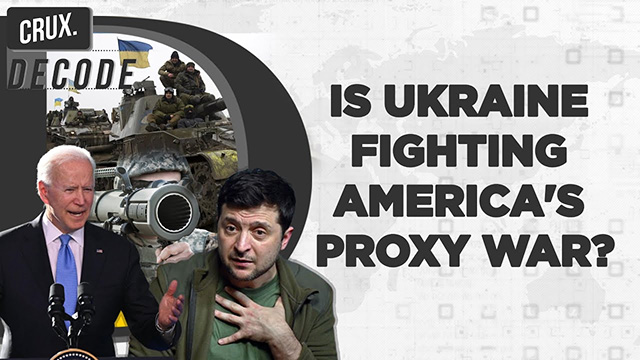
The decision by European Commission President Ursula von der Leyen to travel to Kyiv to rechristen 9 May Victory Day as ‘Europe Day’ marked the height of cynicism. Von der Leyen’s grandfather had served as sergeant in Hitler’s dreaded SS in Ukraine during the massacre of Jews known as Babi Yar, in a ravine on the northern edge of Kyiv in 1941, which is regarded by historians as one of the largest mass shootings of Jews in German-occupied Europe, stresses “The Tribune India”.
What is often overlooked is the recrudescence of Nazi ideology in Germany and elsewhere in Europe. It may seem an esoteric thing, but is a living reality that traumatises the Russian psyche, having sacrificed over 40 million lives in World War II.
Von der Leyen’s remark to reporters on the train to Kyiv that “Ukraine is part of our European family” will resonate in Moscow as a stark reminder of the imperatives of ‘de-Nazification’ of Ukraine, which is a central plank of Russia’s special military operation in that country. If the neo-Nazi elements in Ukraine and Germany get entrenched with tacit state support, they can pose a major challenge to Russia. Therefore, for Moscow, ‘de-Nazification’ of Ukraine will remain a top priority even if it annoys some German elites.
Moscow has vowed to bring to justice the perpetrators of crimes, bordering on ethnic cleansing, against the Russian community. These crimes were committed by neo-Nazis who were the foot soldiers in the US-backed coup and regime change in Ukraine in 2014. How can Moscow possibly settle with a regime in Kyiv that includes the descendants of the ’Banderites’, the murderous collaborators of Nazis who were engaged in the atrocities of Holocaust, or regard them as “family members” of West Europeans?
Equally, the timing of the drone attack on the Kremlin in the immediate run-up to the Victory Day was anything but coincidental. It was likely intended as an affront to the Kremlin leadership — and President Putin personally.
Russia has alleged US collusion, and at any rate, the incident took place within days of the threat held out by Gen. Kyryl Budanov, head of Ukraine’s military intelligence, via the Western media that “we’ve been killing Russians and we will keep killing Russians anywhere on the face of this world until the complete victory of Ukraine.”
Nevertheless, US Secretary of State Antony Blinken was dismissive about the Russian reports of drone attacks on the Kremlin, calling them “a very large shaker of salt.” An elaborate charade is playing out — for appearance’s sake, the US routinely marks distance from acts of terrorism by HUR, while at the same time also refusing to sanction its officials indulging in acts of terrorism.
Meanwhile, Washington has thrown down the gauntlet to the Kremlin with another step forward in NATO expansion that includes Sweden and Finland. Again, NATO expansion is at the core of the tensions between Russia and the US and the one main reason precipitating the Russian intervention in Ukraine. To be sure, Putin’s first move after Victory Day has been to sign a decree on Russia’s exit from the 1990 Treaty on Conventional Armed Forces in Europe (CFE).
Although Washington announced in 2011 its reservations about the treaty with regard to Russia, putting the future of the pact in serious doubt, Moscow has chosen to react only now to the alliance’s conventional superiority in Europe achieved during the past two-three decades. The forthcoming NATO deployment to Finland and Sweden provides the immediate backdrop.
In an explanatory note on May 10, Moscow accused the US and its allies of pursuing a military confrontation with Russia, with disastrous consequences. A major expansion of Russia’s conventional military power is in the cards to meet potential threats of a continental war precipitated by NATO.
The paradox today is that how the Ukraine crisis ends will be largely determined by the result on the battlefields, but NATO’s military confrontation with Russia is now poised to expand beyond the scope of those battlefields. Last Thursday, with tacit US encouragement, Britain took the pioneering step as the first NATO member country to start supplying long-range cruise missiles to the war theatre in Ukraine that can hit Russian territory deep behind the frontlines.
All in all, the current situation conveys the extreme difficulty to reach consensus on the Ukraine crisis. Washington has to take a call at some point soon enough, given the evolving geo-strategic situation where the US may well find itself having to fight a two-front war, which it cannot possibly win despite its military strength.
read more in our Telegram-channel https://t.me/The_International_Affairs

 11:44 18.05.2023 •
11:44 18.05.2023 •






















